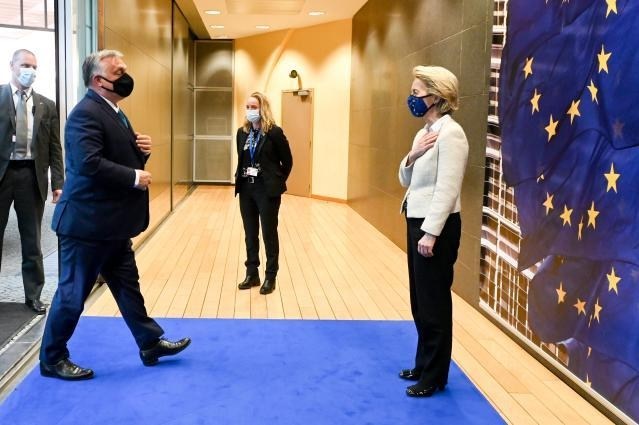Hungary's Prime Minister Viktor Orban met European Commission President Ursula von der Leyen on Friday evening to discuss his country’s share of EU’s COVID-19 recovery package. If the rule of law mechanism is implemented, Hungary might lose some of the funding.
The European Council adopted the Recovery and Resilience Facility of €672,5 billion in loans and grants at a summit in December. The facility entered into force in February 2021. The member states are supposed to present their national recovery and resilience plans, including clear milestones and targets, by this week (30 April).
The Council also agreed on a compromise on the rule of law mechanism which will allow for the suspension or reduction of EU funding to member states with focus on financial irregularities. However, according to the Council decision further legal clarification by the European Court of Justice (ECJ) is required.
Only after its judgement, which has not yet been issued, will the Commission finalise guidelines on the application of the mechanism. Both Hungary and Poland have filed legal complaints to the court. In the meantime, the Commission is not proposing any measures under the mechanism but has assured that it already has started to look at possible cases.
The chief spokesperson of the Commission confirmed at a press briefing on Friday that direct meetings on the recovery package between von der Leyen and EU leaders are rare. No details about the outcome of the meeting have been disclosed. The Commission president tweeted afterwards that she had a “good meeting” with the Hungarian Prime Minister and that various issues were discussed.
“Orban is eager to get his slice of the pie, even though he threatened late last year to veto the entire recovery fund,” commented Professor R. Daniel Kelemen, an expert on EU law and Professor of Political Science and Law and Jean Monnet Chair in EU Politics at Rutgers University.
“Although he backed down in the end, he now faces the prospect that the Commission may call for a suspension of some of his EU funds in the coming years.”
To make matters worse for Orban, his party was recently pushed out of the centre-right European People's Party and lost the protective shield they long provided him. “He is likely to play nice with von der Leyen at their meeting in hopes of convincing her not to suspend the flow of EU subsidies to the EU's first autocratic member government."
Professor Kelemen is convinced that the court cases in the ECJ will be rejected by the court. “The Commission could trigger the first stage in the regulation tomorrow by sending Hungary a notification explaining how the regime’s violations of rule of law norms put at risk the financial interests of the Union,” he told The Brussels Times.
“There is no legal basis in EU law for delaying implementation of the regulation until after the outcome of those court challenges or to wait for the Commission to issue so-called guidelines,” he added and called on the European Parliament and national governments to stand up for the rule of law and the protection of EU taxpayers’ money.
M. Apelblat
The Brussels Times

